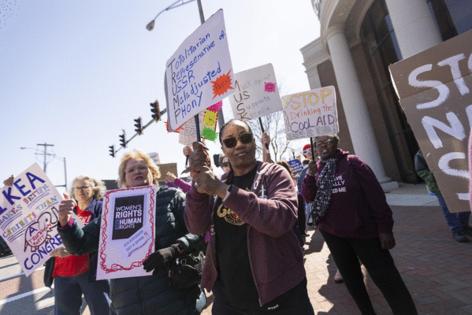Commentary: Trump puts marginalized people at risk
Published in Op Eds
When I was 18, I found myself in a relationship that rapidly oscillated between affection and abuse. That experience helped me to understand, years later, the cycle of power and control inherent to domestic violence, enabling me to avoid future abusive relationships and foster healthy connections.
I owe this understanding to the support and education I received from a domestic violence organization. I went on to co-found an organization, Sahiyo, based in Cambridge, Massachusetts, which focuses on ending female genital mutilation/cutting in countries around the world, which involve some of the same elements of power and control as gender-based violence.
Like many nonprofits, my group was affected by the Trump administration’s attempted federal funding freeze on organizations that provide services to victims of gender-based and domestic violence. That freeze, while brief, ignited fears about the future of our organization, which for fiscal year 2024 drew 43% of its funding from federal grants.
We were forced to ask ourselves: Will we be able to maintain our current operations? Will our funding disappear overnight? Most importantly, do we remain silent, or speak out and risk further consequences?
Some of those who work in these areas, I know, are altering website content, obscuring ties to marginalized communities such as trans youth and racial minorities, and downplaying diversity, equity and inclusion initiatives due to a fear of losing funding.
It is not an unwarranted fear. For several months earlier this year, information on funding opportunities was removed from the Office on Violence Against Women (OVW) website. A few funding notices were re-released in early May, but with language which made clear that funding requests for programs that serve LGBTQ+ or immigrant/refugee populations will no longer be allowed — further putting the overall health and wellbeing of our communities in harm.
What’s more, in early March, the National Conference on Child Abuse and Neglect and the Futures Without Violence Conference on Health were both abruptly canceled. These conferences are crucial for advocates to connect, share experiences and learn effective strategies. I fear more such cancellations are forthcoming.
The administration’s rhetoric further undermines the movement to end violence. Trump’s proclamation in early April for National Sexual Assault Awareness and Prevention Month exemplifies this: “One of the leading causes of sexual violence over the last four years has been the invasion of illegal aliens at our southern border.”
This statement is blatantly false. Most victims of sexual assault are harmed by someone they know; eight out of 10 instances of rape are committed by someone known to the victim. Furthermore, immigrants face higher rates of sexual violence than natural-born citizens and are less likely to commit crimes. The proclamation serves to maintain power and advance false narratives.
Organizations working in gender-based violence know these dynamics intimately. We support clients by assuring them they are not alone and providing them with resources to escape abusive situations. Sharing our stories is essential to counter these false narratives, advocate for funding and policies like the Violence Against Women Act and protect vulnerable communities.
In just five months, the Trump administration has undone years of cooperation between the federal government and nonprofits like mine. But social justice advocates are speaking out. More than 625 organizations recently urged Attorney General Pam Bondi to protect federal funding for victim services.
“The undersigned local, state, and national service providers have been anguished and panicked to receive recent notices terminating their federal grants,” the letter said. “Without federal funding many of these organizations will close leaving communities less safe, with reduced access to victim services, law enforcement assistance and prevention programs.”
We are at a pivotal moment. To ensure that all women and girls can access services to live free from violence, Congress must advocate for accountability and continue to implement and enforce laws like the Violence Against Women’s Act, which provides funding for organizations focused on gender-based violence.
Speaking out is not easy, but social justice advocates and the public at large must share stories of our work and experiences to connect with legislators and advocate for those we serve. We must speak loudly, proudly and defiantly. If we remain silent, we risk reversing decades of progress in ending gender-based violence.
_____
Mariya Taher is the cofounder of Sahiyo, an organization with the mission to empower Asian and other communities to end female genital cutting/mutilation, and a Public Voices fellow on Advancing the Rights of Women and Girls with The OpEd Project. This column was produced for Progressive Perspectives, a project of The Progressive magazine, and distributed by Tribune News Service.
_____
©2025 Tribune Content Agency, LLC.

























































Comments